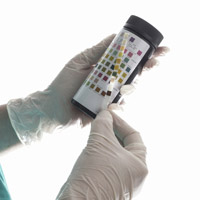A low-cost urine test that could save thousands of lives
Tuberculosis (TB) is an infectious bacterial disease that affects the lungs and kills nearly two million people every year. Most of these deaths occur among the poorest communities in the world, where access to medical care is scarce. The tragedy of this is that the disease is preventable and curable; what is needed is early detection and treatment. Indeed, one problem has been the lack of cheap, rapid and accurate diagnostic tools capable of reaching some of the remotest and poorest parts of the world. This is something that the EU-funded POCKET project aims to address, by filling the gap between high-end, sensitive but expensive tests and low-end, cheap tests plagued by limited accuracy. Started in November 2013, the initiative is already well on track to developing a low-cost urine test that will make TB detection accessible to all. At the moment, researchers working on POCKET are trying to integrate a number of novel technologies. These include nanophotonics (which is about how light interacts with substances at the nanometre scale) and novel selective antibodies (proteins used by the body’s immune system to identify and neutralise bacteria and viruses). From this work, the research team will develop a tool that is capable of detecting the presence of TB antibodies through urine. The POCKET test will feature a sensor in a silicon nitride chip, capable of issuing a low-cost readout on whether TB antigens in urine have been detected. This is not as simple as it sounds; antibodies to be detected will be different depending on whether the person is infected with HIV. This increases the complexity of the procedure. Nonetheless, the researchers firmly believe that they will be able to deliver point-of-care TB tests that cost between EUR 5 and 10 per end-user, and offer an accuracy rate of over 80 %. This would represent a significant improvement on current solutions, which are able to identify 60 % of TB-positive patients. The economic benefits of this innovation could be considerable. One third of the world’s population has latent TB, which may later develop into an active form of the disease. TB has also become the leading cause of death among people with HIV. Early, cheaper testing means lower healthcare costs in the long term, and greater productivity. Far too many lives are needlessly lost to this disease, which, after all, can be treated. The test will also have applications for other parts of the world. Although most cases of TB occur in developing countries, the infection is re-emerging in major urban populations in Europe due to the increase in global travel, presenting a real health concern here. During the final year of the project, field trials will be organised in Africa and India. POCKET is scheduled for completion in October 2016, though the expectation is that its impact on healthcare will be felt for years to come. For further information, please visit: POCKET http://www.pocket-proj.eu/
Countries
Belgium



